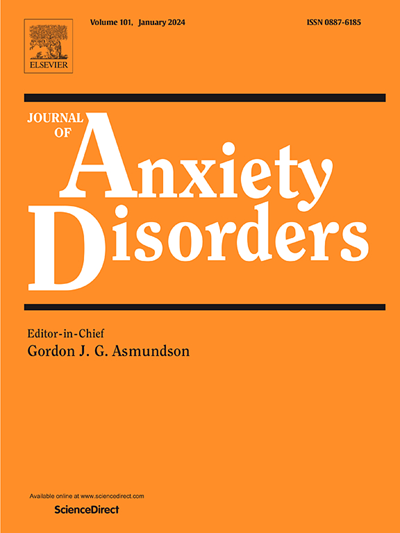Who defines improvement? Patients' global reports of improvement compared to standardized measures of improvement in cognitive processing therapy for posttraumatic stress disorder
IF 4.5
2区 医学
Q1 PSYCHIATRY
引用次数: 0
Abstract
Standardized measures have typically been used to assess symptom change during treatment in psychological research and practice. However, standardized measures may not fully capture patients' experiences of therapeutic change. Patients' global reports of their improvement during treatment across domains of symptoms and functioning are also important and may provide distinct information from standardized measures. The current study compared both types of patient reports of improvement during cognitive processing therapy (CPT) for posttraumatic stress disorder (PTSD). We also examined process-level predictors of improvement assessed using both methods. Participants were 254 adult survivors of interpersonal violence receiving CPT. Patients' global reports of improvement in each domain (PTSD symptoms, relationships, health concerns, sexual functioning, school/work performance, and life satisfaction), each rated on a Likert scale via the Treatment Outcome Questionnaire, were significantly correlated with the corresponding standardized measure of improvement in the same domain, with most effect sizes in the small-to-medium range. Patients' perceptions of the therapy (helpfulness, likability) significantly predicted both global ratings and standardized measures of improvement, while patients' perceptions of the therapeutic relationship, patients' perceptions of barriers to therapy attendance, and objective indices of attendance did not predict improvement. Results highlight the importance of patients' experiences with treatment and suggest that assessing patients' global ratings of their improvement during treatment provides distinct information from standardized measures of improvement, and both are important to include when measuring therapeutic change.
谁定义改进?与创伤后应激障碍认知加工治疗的标准化改善措施相比,患者的全球改善报告
在心理学研究和实践中,标准化措施通常用于评估治疗期间的症状变化。然而,标准化的措施可能无法完全捕捉到患者治疗变化的经历。患者在治疗期间跨症状和功能领域的整体改善报告也很重要,可能提供与标准化措施不同的信息。目前的研究比较了两种类型的患者在创伤后应激障碍(PTSD)的认知加工治疗(CPT)期间的改善报告。我们还检查了使用两种方法评估的过程级改进预测因子。参与者为254名接受CPT治疗的成年人际暴力幸存者。患者在每个领域(创伤后应激障碍症状、人际关系、健康问题、性功能、学校/工作表现和生活满意度)的整体改善报告,通过治疗结果问卷(Treatment Outcome Questionnaire)在李克特量表(Likert scale)上进行评分,与同一领域相应的标准化改善措施显著相关,大多数效应量在中小范围内。患者对治疗的感知(乐于助人、讨人喜欢)显著预测了整体评分和标准化改善措施,而患者对治疗关系的感知、患者对治疗出勤障碍的感知和出勤的客观指标不能预测改善。结果强调了患者治疗经历的重要性,并表明评估患者在治疗期间对其改善的总体评分提供了与标准化改善措施不同的信息,并且在衡量治疗变化时,两者都很重要。
本文章由计算机程序翻译,如有差异,请以英文原文为准。
求助全文
约1分钟内获得全文
求助全文
来源期刊

Journal of Anxiety Disorders
Multiple-
CiteScore
16.60
自引率
2.90%
发文量
95
期刊介绍:
The Journal of Anxiety Disorders is an interdisciplinary journal that publishes research papers on all aspects of anxiety disorders for individuals of all age groups, including children, adolescents, adults, and the elderly. Manuscripts that focus on disorders previously classified as anxiety disorders such as obsessive-compulsive disorder and posttraumatic stress disorder, as well as the new category of illness anxiety disorder, are also within the scope of the journal. The research areas of focus include traditional, behavioral, cognitive, and biological assessment; diagnosis and classification; psychosocial and psychopharmacological treatment; genetics; epidemiology; and prevention. The journal welcomes theoretical and review articles that significantly contribute to current knowledge in the field. It is abstracted and indexed in various databases such as Elsevier, BIOBASE, PubMed/Medline, PsycINFO, BIOSIS Citation Index, BRS Data, Current Contents - Social & Behavioral Sciences, Pascal Francis, Scopus, and Google Scholar.
 求助内容:
求助内容: 应助结果提醒方式:
应助结果提醒方式:


